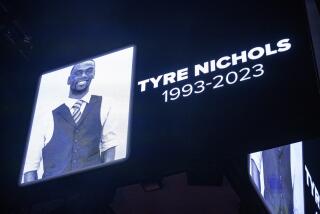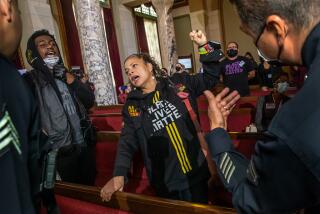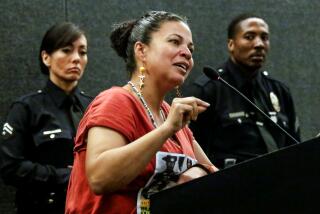Defense Says Use of Force on King Was Reasonable : Courts: A motion in the upcoming civil rights case refers to a ‘PCP-crazed giant,’ suggesting that the officers’ lawyers will aggressively challenge King’s actions.
- Share via
In a preview of the defense strategy to be employed by the Los Angeles police officers charged with violating Rodney G. King’s civil rights, lawyers for three of the defendants said Tuesday that the force used against King was reasonable because of his behavior in resisting arrest.
“The picture of the force used on Rodney King may not be pretty, but who started the whole trail of events?” the defense lawyers asked rhetorically in a motion filed Tuesday. “Civil society has a right to be defended against people like Rodney King, and the way it does it is by having officers willing to use reasonable force and not nit-picking their instantaneous judgments.”
Defense lawyers filed the motion in an effort to persuade U.S. District Judge John G. Davies that prosecutors should be required to prove that the officers beat King because he is black if they are to be convicted of violating his civil rights. The motion, which refers to King as a “PCP-crazed giant,” suggests that the defense team for the coming trial will aggressively challenge King’s actions, a tactic sure to inflame already heightened passions over the case.
The motion was written by lawyers for Sgt. Stacey C. Koon and officers Timothy E. Wind and Theodore J. Briseno. Michael P. Stone, who represents Laurence M. Powell, was said to be filing a separate motion based on different grounds.
King’s lawyer, Milton Grimes, angrily dismissed the characterization of his client, saying it is a “sickening attempt to influence the public through the media with statements that have absolutely no foundation.”
Grimes was particularly incensed by the description of King as “PCP-crazed,” noting that King never tested positive for that drug.
In addition, the lawyers defended the actions of their clients by noting that police officers are forced to make split-second decisions that can cost them their lives; the filing portrays the police as society’s last bulwark against violence.
“An officer who makes a mistake in the evaluation of necessary force will be rewarded by the police chief handing his widow a folded American flag at his grave site,” the lawyers wrote. “What would happen if peace officers simply laid down their batons and guns and went home for fear that any application of force would subject them to a criminal prosecution? Ask Reginald Denny what happens when a police department will not use force.”
Denny is the truck driver who was beaten nearly to death during the riots that followed not guilty verdicts for the police officers on all but one count in state court. The attacks on Denny and other motorists during the riots were blamed in part on the slow response of police officers.
King’s actions also were sharply criticized during the state trial of the officers, and prosecutors in that case decided not to call King as a witness. But in this trial, where the prosecution must show that the officers intentionally used unreasonable force, King is expected to testify.
Most legal scholars say that proving a civil rights charge does not require a showing of racial malice. But the defense lawyers say this case requires such a showing because the force used against King was reasonable unless it was racially motivated. If the beating were administered because of King’s race, then it would be a violation of his right to equal protection under the law, the defense lawyers said. Otherwise, they argue that the force used to subdue King was justified by his actions toward the officers.
“Rodney King refused instructions to stop, drove at over 100 miles per hour, refused instructions to assume a felony prone position, resisted attempts to determine whether he had a weapon, repelled four officers who grabbed his limbs, withstood 100,000 volts of electricity and lunged at Officer Powell,” the defense attorneys wrote. “How much force is needed to subdue this unruly, PCP-crazed giant?”
Although medical tests did not reveal that King was under the influence of PCP, defense lawyer Harland W. Braun said the issue is how King appeared to the officers.
Prosecutors already have indicated that they are not prepared to prove that the March 3, 1991, beating was racially motivated. They argue, citing numerous legal precedents, that they must only show that the beating was an intentional use of unreasonable force and therefore that it violated King’s constitutional right to be secure in his person.
Judge Davies last week asked the defense lawyers to file their arguments regarding race. He indicated that he would rule after considering the written motions.
More to Read
Sign up for Essential California
The most important California stories and recommendations in your inbox every morning.
You may occasionally receive promotional content from the Los Angeles Times.











